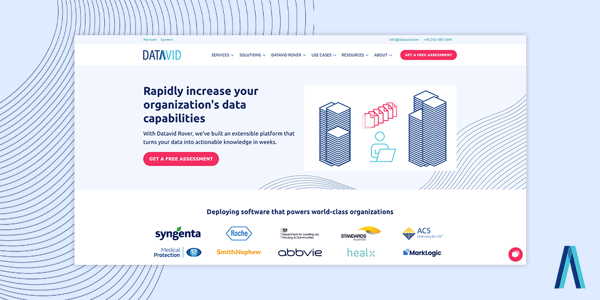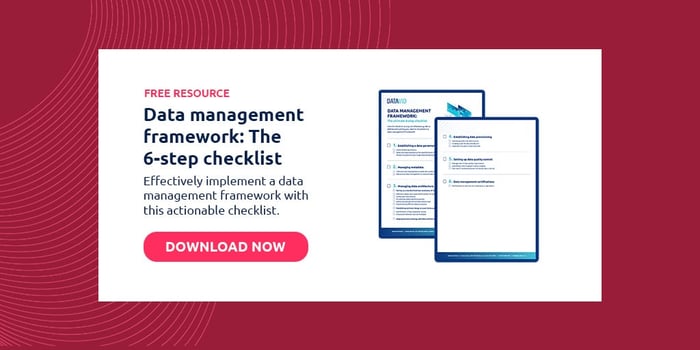3 minute read
What is a data discovery service? 3 benefits to know about
Data discovery reveals patterns and trends which are hard to find otherwise. Here are 3 benefits of leveraging a data discovery service.
Table of contents
Businesses need to derive insights from their data to make informed decisions. This is where a data discovery service comes in. It uncovers obscure patterns by unlocking your company’s hidden knowledge.
You put a lot of effort into collecting data: tracking behaviour, logging software performance, surveying clients…
These are just some of the things you can do as part of your data practices. You also likely pay for services designed to help you gather this data.
But what about a data discovery service?
Extracting value from your data can be much more challenging than just collecting it.
Over time, extracting meaningful insights from large quantities of data becomes increasingly unmanageable.
Data comes in different formats and from different sources.
Some of it is corrupt.
Some of it is misleading.
Relationships between data points are especially difficult to understand.
This is where data discovery becomes crucial.
What is data discovery?
The primary goal of data discovery is to find hard-to-spot patterns that provide insights into what works well for your business and what doesn’t.
This means uncovering hidden connections between different documents—and different types of data.
Specifically, leveraging a data discovery service helps you make the most of your historical data using intelligent search methods.
It also means being smarter than your competition.
One way to outsmart competitors is through cognitive search. Cognitive search goes beyond simple keyword matching and gives meaning to your data.
Think about it this way.
If you search for your valued customer, John Sharp, do you want to find:
- Thousands of results about the order and maintenance of the Sharp monitors your company uses, mixed with a tiny fraction of customer records, or;
- Why does John Sharp use your service? What additional services might he be interested in? Why did he contact customer service that one time, and which other users did he refer to your company? Then, a visual representation of everything pertaining to John and how the documents relate to one another.
Traditional keyword search gives you 1.
Cognitive search gives you 2.
And that’s where data discovery makes a big difference.
The benefits of data discovery
As an established company, you have several advantages over new startups. One major advantage is that you have a ton of historical data.
From this data, you can gain insights that new competitors can’t match.
These insights can help you solidify your market position and make your competitors fight an uphill battle.
They have to innovate in the dark, but you don’t.
However, it all hinges on how you use the data.
If you don’t have a way to distill data into insights that improve your bottom line, your market advantage will fade.
Even if you have existing business intelligence procedures, it’s very likely that something is lacking—regardless of whether you rely on human analysts or automated software.
There are 3 main benefits of using a data discovery service:
Benefit #1: Data discovery outperforms humans
Humans have a hard time dealing with large quantities of data.
When people look at data, they make assumptions about what they expect to find, and their brains try to forge patterns to match those assumptions.
AI-based data discovery is different.
It highlights only the things that match factual patterns, with zero bias.
Benefit #2: Data discovery outperforms search algorithms
Traditional search algorithms don’t fare much better—simple keyword searches become exponentially less useful as data complexity increases.
To put data into context, it’s not enough to search.
You must explore and make connections until patterns emerge.
That’s what a discovery process does for you.
Benefit #3: Data discovery leverages machine learning
The aim of machine learning algorithms is to connect you to the meaning behind your data, not to present you with a list of every data point you’ve ever saved.
Through a mechanism called the bias-variance tradeoff, you can uncover patterns that would otherwise remain obscure. This is key to fully leveraging your data.
It is difficult to overstate the value of uncovering hidden patterns in your data.
The more unexpected the pattern, the more potential it has to drive innovation.
Choosing the right data discovery service
Almost all analytics platforms have limited capabilities. Many struggle with connecting different documents, particularly between different data types (also known as “models” for semantically related concepts).
Others are clunky and difficult to integrate. Most are geared toward tech-savvy users and lack a friendly user interface (if they have one at all).
To drive innovation, you need to unearth the relationships within your data.
And that’s where a solution like Datavid Rover comes in.

It does all the work for you, allowing you to focus your attention on what actually matters—deciding the business action you should take based on its findings.
Datavid emphasises building visual tools that will help you connect to the meaning behind your data—not just “connect and forget.”
And the good part?
Data discovery is embedded within it:
- Real-world relationships
- Knowledge graphs
- Key entities
It’s all meant to enhance how you discover the value hidden within your data. So, next time you’re shopping for a data platform, look for data discovery!
Frequently Asked Questions
What is data discovery?
Data discovery is the process of collection and evaluation of data to uncover hard-to-spot patterns and trends.
What are the benefits of data discovery?
Benefits of data discovery include identifying occurrences and trends, and uncovering and visualising relationships between the data.
What is cognitive search in data discovery?
Cognitive search is the process of searching by understanding the users’ search intent and providing contextual insights from the data.




